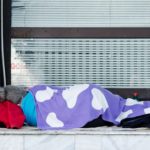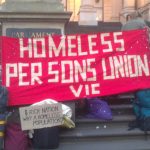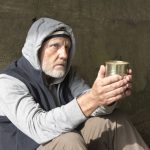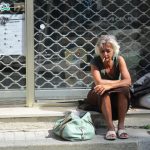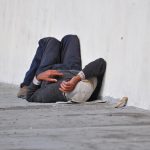Sydney’s 24-7 Street Kitchen and Safe Space: An Interview with Lanz Priestley
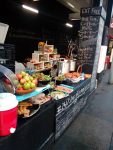
In February this year, there were 948 homeless people in Sydney, according to City of Sydney statistics. Of these, 433 people were sleeping rough, 489 were occupying crisis and temporary accommodation, while 26 were hospitalised.
At Central’s Belmore Park and Wentworth Park in Glebe, groups of tents are regularly pitched, sheltering some of the city’s rough sleepers. However, as these communities of homeless people grow, the council eventually moves them on.
NSW has more people without a fixed address than any other state or territory in Australia. State-wide, there were an estimated 29,191 homeless people in 2013, according to a Homelessness Australia factsheet.
Currently, 59 percent of people seeking homelessness services around the country are women. And charities report that the fastest growing group of people experiencing homelessness are women over the age of 55.
There’s a lack of affordable housing in Sydney and rental prices are going through the roof. If the housing crisis continues on unabated, it’s expected that many more of the city’s socially disadvantaged and marginalised will end up on the streets.
A space for the homeless
In Sydney’s Martin Place, a group of homelessness advocates have taken matters into their own hands. Beneath an awning that lines the building opposite the Reserve Bank, Sydney’s 24-7 Street Kitchen and Safe Space has been set up.
Established in mid-December last year, the kitchen is serving meals to many of the people on Sydney’s streets. They’re also providing a space where rough sleepers can lie down for the night without worrying about the dangers they can face on their own.
Along with food and shelter, the project is also providing clothing and reading materials to the homeless. And everything that’s distributed by the street kitchen is being donated by the general public.
Council raids
However, Sydney’s 24-7 Street Kitchen and Safe Space does have its critics.
The City of Sydney’s homelessness unit – accompanied by police – have raided the set up four times. The rangers have confiscated gas bottles and barbecues, along with other items they’ve considered dangerous.
The safe space organisers report that the City of Sydney said they would provide an itemised list of what had been seized. However, up until now, the council has failed to do so.
A homelessness activist
Lanz Priestley is the co-founder of the 24-7 Street Kitchen and Safe Space. He’s been a tireless advocate for Sydney’s homeless for decades now. Mr Priestley played a part in the inception of the worldwide Occupy movement, and was involved with Occupy Sydney.
Sydney Criminal Lawyers® spoke with Lanz Priestley about the need for a safe space for the Sydney’s homeless, what the volunteers are providing at the set up, and the attempts to shut them down.
Firstly, Lanz, what sparked off this initiative?
We had a Sunday homeless dinner, which we were doing down here. And the women that were coming to that dinner were telling us that they didn’t feel safe. In particular, because they were waking up to guys trying to sleep with them, and in some cases forcibly.
At that stage, to my mind, you have to do something, and we didn’t have time to dot the ‘i’s and cross the ‘t’s. We rolled it out 48 hours later.
And who’s running the kitchen and safe space?
The people on the ground here are. There’s no one else sitting behind us. There’s no one pulling the strings at all.
How many people do you estimate you’re helping each day?
In terms of people sleeping here, we have between 38 and 50. Over the weekends, when it rains, I stop counting at 55. We just cram people in.
In terms of people that are using the space, between 400 and 500 on any given day.
And what do you actually provide the city’s homeless with?
The first thing is, we obviously provide the safe space.
Because our basic ethos is equality, we can’t say we’re just providing it for women, nor do we say that we’re just providing it for homeless people. Everything that we provide down here, we provide it to everybody that needs it.
The food is for anyone that’s hungry. We provide clothing. We provide food to go out to houses. We’re currently doing between 170 and 240 food parcels a week.
We provide the ability for people who are sleeping rough to be able to leave their gear here, so they can go to various interviews, which might just facilitate getting them off the street.
We have a medical kit here for basic medical stuff.
We have Narcan (naloxone) registered people here. And we’re actually running a workshop in conjunction with a service provider to get more people Narcan trained, so we can have people who are on the spot in the various camps if anyone overdoses.
We have support people now working with people who are having difficulties dealing with paperwork and government departments in general.
The Housing Department are embedded down here on Thursday nights. It’s the first time the Housing Department have ever operated at night and they’re finding the concept way more than they thought they would have to cope with.
How do you go about sourcing the food and materials that you provide for free?
Absolutely crowdsourcing it.
The City of Sydney’s homelessness unit has been carrying out raids on the street kitchen and safe space. Is that correct?
The City of Sydney have. It’s multiple departments that are involved in those raids. But, they’re initiated by the homelessness unit.
So the council has a homelessness unit to deal with this sort of thing?
Well, they tell the public that they deal with this sort of thing, yeah.
I’ve been around the homelessness scene in Sydney for a long time. We actually set up Martin Place as a space to feed homeless people in 1991. In all the time that these homelessness units have been in existence, I can’t think of one thing they’ve done.
I’ve actually asked them to show me one positive thing that they have initiated for homeless people. And they haven’t actually been able to help me out.
And what actually happens when the raids take place?
They turn up with a fleet of trucks. They scatter their trucks across the space between where we’re set up and the Reserve Bank.
They just come in and start taking stuff. They belatedly hand out notices, which purport to have been pre-served on us.
The council has tried to move you on. They also try to move people on from Wentworth and Belmore parks.
Is that the City of Sydney’s policy, to move people on once they’ve set up a safe area to stay in? And where does the council expect these people to go?
That is one of the questions. The City of Sydney, when you look at its framework of policies, seems to have an out-of-Sydney-centred solution. It’s engaged with NGOs. And the parameters it set those NGOs to operate under mean that the only available accommodation is not in Sydney city.
Sydney city is priced out of the market.
I understand there’s actually a ban on people camping and staying overnight in Martin Place. Why did you choose that part of the city to set up in?
We pre-established that back in ‘91. It’s an area that’s known to the homeless community. We’ve had people come here, who’ve been housed and had jobs for twenty years, and they’ve suddenly become homeless again.
It’s a well-known location for homeless people to go to. And we were substantially expedited by the fact that there’s this awning here now that we can use as a shelter.
And Lanz, just how dire is the homelessness situation in Sydney at the moment?
I’ve never seen so many new people come on the streets. Post January 1, there’s been an upsurge.
A lot of it is temporary – people becoming homeless for between one and three weeks. At that level, it’s often fixable. But we haven’t seen that demographic on the streets before.
So there’s this ever-increasing number of people sleeping rough. What do you think has to change in order to help this situation?
We have to change a whole lot of settings that the country operates under. Homelessness isn’t actually the problem. It’s one of the manifestations.
Another one of the manifestations, which people see and don’t correlate – and they see it every year – is the kids that leave school at 18, who can’t afford to house themselves under their own steam in the community they grew up in.
When you stand back from that, it’s just plain wrong. And it’s destructive of the community, as well. That has the same common denominator, as those rough sleepers you see in Martin Place.
The actual problem is a chronic shortage of affordable housing. And in order to address that, we need to make housing universally affordable.
And lastly, what can the public do to help out Sydney’s 24-7 Street Kitchen and Safe Space?
We’ve got a call-out. We’re now starting to furnish houses.
So we’ve got a call-out for supplies down here. We’ve got an ongoing call-out. We need vegetables, meat, blankets, sleeping bags, clothes and books.
But, we’re adding to that now anything that fits into a house, because we’re furnishing eight houses in the next nine days. We’ve furnished seven houses in the last week. And the need for that is increasing.
So we’ve got a different methodology for collecting the furniture. But they can phone us on 0410 722 000. They can phone us and discuss that. Normally, people tell us where the furniture is located. It’s going straight into houses that are being set up for people that need housing.
People can donate down here 24 hours a day. We’re operational 24 hours a day and taking donations too.
Lanz thanks very much for taking the time out to have this chat with us today. And continued success with your initiative to help this city’s homeless.
You’re very welcome.


